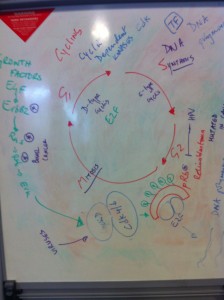Cancer & Genetics Student Selected Component…
11 November 2014Last week, the Institute of Cancer and Genetics hosted a new Student Selected Component for Year 2 Medical Students. The feedback was very positive. Both students and tutors were happy with the experience.
The SSC was designed jointly by Dr Ned Powell and myself with help from Dr Derek Lang, Dr Laura Thomas, Dr Kayleigh Dodd and Dr Alex Tonks. It included interactive teaching sessions, laboratory sessions and some self directed learning. The assessment required the submission of a self reflective piece and the delivery of a group presentation about the students’ lab experience.
Day One
The first teaching session was on Monday morning. The students were welcomed and we discussed some of the basic concepts of cancer biology including out of control cellular proliferation, lack of cellular apoptosis, cellular signalling pathways.
We talked about how cancer is not really one disease but many different diseases with different causes, different outcomes and different treatments. We reviewed the phases of the cell cycle and talk about the ras-MAPK signalling pathway.
I find the ras-MAP kinase pathway interesting because it links directly to the cell cycle and contains proteins that are often mutated in cancer. Growth factor receptors, ras and raf are used for tumour genetic profiling. Growth factors and raf are targets of cancer treatment. We briefly mentioned other cell signalling pathways, like those initiated through PI3K, and the importance of p53 and genome stability but I didn’t want the science to get too complicated on the first day.
After some science, the students had the opportunity to select a publication that was chosen by their laboratory tutors. The papers were:
- Davis T, Tivey HS, Brook AJ, Grimstead JW, Rokicki MJ, Kipling D. (2013) “Activation of p38 MAP kinase and stress signalling in fibroblasts from the progeroid Rothmund-Thomson syndrome.” Age (Dordr). 35:1767-83.
- Hole PS, Pearn L, Tonks AJ, James PE, Burnett AK, Darley RL, Tonks A (2010) “Ras-induced reactive oxygen species promote growth factor-independent proliferation in human CD34+ hematopoietic progenitor cells.” Blood 115:1238-1246
- Lin TT, Letsolo BT, Jones RE, Rowson J, Pratt G, Hewamana S, Fegan C, Pepper C, Baird DM (2010) “Telomere dysfunction and fusion during the progression of chronic lymphocytic leukemia: evidence for a telomere crisis.” Blood 116:1899-1907
- Qin W, Kozlowski P, Taillon BE, Bouffard P, Holmes AJ, Janne P, Camposano S, Thiele E, Franz D, Kwiatkowski DJ. (2010) “Ultra deep sequencing detects a low rate of mosaic mutations in tuberous sclerosis complex.” Hum Genet.127:573-82.
These four papers were a good reflection of the strengths and variation of the research across the Institute. The students has the opportunity to look at the abstracts and chose the area of research in which they were interested. In groups, the students read the abstract of the papers trying to identify the key concepts. We discussed some of the technical words and concepts. One concept we discussed was cellular senescence a key feature of ageing and a cellular control that is escaped for a cell to become malignant.
Day Two and Three
Over the course of the following two days, the students were hosted by their lab tutors:
Day Four
The students were asked to reflect on the previous three days and to identify one thing they had learned. They were also asked to pose a question about cancer research. They were divided into groups which mixed them up between the labs they had visited and encouraged to share and discuss their experiences. The objective was to learn from their colleagues and to prepare them, in a formative way, for their self reflective piece.
Two particular questions were of interest to the students:
- How close are we to a ‘cure for cancer’?
- How is cancer research funded?
To address the question of a ‘cure for cancer’, we discussed the progress made in cancer treatments over the last 20 years or so. We discussed the success of imatinib as a treatment for chronic myeloid leukaemia. We also discussed the improvements in the survival rates for breast cancer.
To address the question about funding, Ned talked about basic and translational funding and the various sources including cancer research charities, NISCHR and Research Councils.
Day Five
The final part of the SSC was the student presentations. The four separate lab group talked about their experiences and the science surrounding it. Across the group, their experience included isolating genomic and plasmid DNA, digesting a plasmid, looking at DNA sequencing, PCR and staining cells. A nice broad range of laboratory techniques reflecting the breadth of activity of the Institute of Cancer & Genetics.
As mentioned previously, the feedback was very positive with all the students enjoying the week. We had one or two areas for improvement but generally it was good week of work.
- June 2024
- May 2023
- September 2022
- August 2022
- February 2022
- January 2022
- November 2021
- November 2020
- September 2020
- July 2020
- June 2020
- May 2020
- November 2019
- June 2019
- May 2019
- December 2018
- June 2018
- November 2017
- June 2017
- July 2016
- June 2016
- April 2016
- October 2015
- July 2015
- April 2015
- March 2015
- February 2015
- January 2015
- November 2014
- October 2014
- August 2014
- March 2014
- November 2013
- August 2013
- July 2013
